|
Versión en español
This is the second part of our interview with Trevor Jones (see first part). The composer talks from The Last of the Mohicans to Around The World in 80 Days, explaining interesting things about his work, his relationships with directors, his son, his new projects, and promising he'll try to release an official CD with his score for Loch Ness. the second part of our interview with Trevor Jones (see first part). The composer talks from The Last of the Mohicans to Around The World in 80 Days, explaining interesting things about his work, his relationships with directors, his son, his new projects, and promising he'll try to release an official CD with his score for Loch Ness.
Seville, June 2004.
BSOSpirit (BS): How did you get involved in scoring The Last of the Mohicans?
Trevor Jones (TJ): Michael Mann contacted me. He had already shot the movie, and we started talking about the music which was required for that film. I found out that he is a very creative director, with very intense feelings about each sequence. I think he is indeed a visionary... Mann was very specific about how he liked the music to be. The film was finished, but he was still very concentrated on it. We spent a nice time talking and developing ideas at night hours for some days; sometimes as long as 4 oíclock in the morning.
BS: The most well known theme of that soundtrack -"The Kiss"- seems to have been inspired by any sort of ancient Gaelic tune...
TJ: What "kiss"? Iím sorry, but I compose my themes according to numbered items, and Iím not well acquainted to the names given in the record...
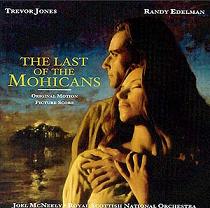
BS: I cannot believe you donít know that theme! It has been a successful hit in anywhereís film music standards... Let me chirp a little bit...
TJ: Oh yes, now I know... This was based on a Scottish jig dance which Michael Mannís wife once heard in her car. Mann suggested me a sort of stem theme (I canít recall if it was recorded or what), and then I worked on planning a good tempo and a convenient orchestral structure...
BS: That piece of music is repeated again in a theme called "Promontory", and to many listeners it has been clearly identified as a main theme of the score... A hit, no doubt.
TJ: Iím glad it came to be so well known. It is certainly the most powerful theme in the score, and I guess that Morgan Creek (the company which produced the soundtrack record) was well aware of this.
BS: In this particular score, you seemed to use both orchestral and electronic instrumentations. Did you manage that with co-composer Randy Edelman?
TJ: Let me inform that I never worked with Randy Edelman... I just met him once in the dubbing studios in Los Angeles and said hello to him. Michael Mann told me he needed more music when I was about to leave back to Europe. So I knew he would contact other musicians, but I didnít take part in his final resolution (Mann also used Clannadís song "I will find you"). In fact, I was committed to work in other scheduled projects, so I had to leave the U.S.
BS: However, Edelmanís music doesnít fit quite well with yours... The final result is somehow strange.
TJ: The recording of that score was indeed one of the strangest experiences in my life...
BS: Why?
TJ: At the time we were recording it in the 20th Century Fox studios there was an earthquake and a frog plague... I felt like living in a Biblical apocalypse. When I travel to the States Iím always very concentrated in my job, preparing the recording sessions. I never watch television or listen to the radio... I can be absolutely out of this world... One day, I watched all musicians abandon the studio by turns... We musicians are very strange people, so I thought they were having something in mind and just let them go... A security agent then came to meet me, explaining there was an earthquake alert and the National Guard was closing all facilities. I had to drive back to the hotel. I stopped to buy some food in a store, which was almost empty... The hotel was invaded by a plague of frogs... I then moved to a big house, and there I was joined by some musicians and their families, we had some nice barbeques there and lots of fun... As you can imagine, I finally left to Europe with a strange sense of confusion.
BS: But the music you recorded was tremendously great... The Last of the Mohicans may be the most well-known of Trevor Jones music scores in Spain, I tell you...
TJ: I must go back to Spain and find out why...
BS: Have you been here before?
TJ: I was once in Barcelona. I was asked to work together there with other film composers for a few days. When I flew back to London, my wife asked me how the city was, but I spent all the time in a recording studio, and hadnít time to see the cathedral (Sagrada Familia) and other very well-known buildings... I hope to return there some day and to explore it properly. So I will with the rest of the country.
BS: 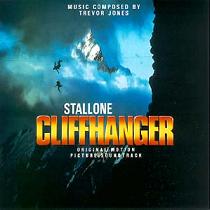 Why is your score for Cliffhanger so similar to the one written for The Last of the Mohicans? Why is your score for Cliffhanger so similar to the one written for The Last of the Mohicans?
TJ: Very easy: because the director asked me to write some music like in The Last of the Mohicans... Iím amazed to see how deep you can touch in my own music. Frankly, you do better than me. Iím used to pass each score as a page in life, leaving it to oblivion, concentrating on the new projects, the fresh work...
BS: But you once said that your scores were almost like your children.
TJ: I meant I love them, I love my craft and I put all my efforts in the laboring of each one of them... But there is only room for present challenges in my brain, so I cannot hang on to past compositions. This craft is about developing a special feeling for an image or a set of images... Even a bad picture can be saved by a good score. It means we have a power and a compromise. Music is part of the cinematographic experience..
BS: Who would remember the shower stabbing in Psycho if it wasnít for Hermannís strings?
TJ: Thatís right. Hermann put a very intelligent tempo on that scene... Without his music, it would be nothing in particular.
BS: Going back to Cliffhanger, you worked then with a previous conception. How often do you use previous conceptions in your work?
TJ: Quite often there is a suggestion pointed out by the director, or a particular theme which keeps dancing in your head. Nevertheless, writing music for the movies is far more than a creative process. You must select a tempo to fit in each sequence. You must work on a specific timing, according to a specific recording schedule and a specific budget.
Sometimes, the director comes with a sort of melody in mind. When he listens to the final score he finds out that his original proposition has been converted into something very different, using other tempos, expanding it with orchestral arrangements... Fortunately, they often respect your work as a composer. We know better than anyone else what exact music any particular scene needs.
I disagree with those who simply fill the scenes with some classical themes they like very much... Itís incestuous! Bach, Beethoven or Vivaldi didnít write for films. Their tempos can hardly adapt to the needed schemes. You can use some parts, play a sort of tribute if you like, but your score has to match adequately with the filmed scenes.
BS: Some day this could be done perfectly by computers...
TJ: It can now be done by computers. But a film cannot rely only in special effects and computing work. A movie is a work of art, it needs a creative involvement, so technical tools need to be mastered by skilled artists in order to bring something new, fresh, different, and meritory. When Ridley Scott came to meet me after shooting G.I. Jane, he wanted a music treatment for his film. He felt like going to the doctor and asking ďWhat can be done with it?Ē
BS: You have worked a lot for television as well.
TJ: TV series can be very comfortable for a composer. You can finish your work only in a couple of weeks; they require quite short themes and the scenes tend to be not complex. You develop your music almost automatically. First thought is best thought. You never stop to think about it -like you certainly do in a movie, in order to understand it the best possible-.
BS: Do you decide on where to make a record or not of your own music scores?
TJ: Maybe I should, but Iím honestly unaware about the final use of my score requests. Some are edited as records, but some arenít.
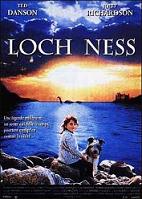 BS: Why thereís not an official record about some very favorite film scores, like Loch Ness?
TJ: Isnít there a record of Loch Ness? I donít know why.
BS: There is an unofficial suite of about 15 minutes, but we miss a complete soundtrack with that superb music...
TJ: As I told you before, Iím not well acquainted with the music written in the past, but Iím conscious I should get compromised in doing so... Recently I was told that all my recorded music was being digitalized. Perhaps I should put it in a web-page... The problem with producing a record is that you need to contact before the film producers in order to ask for permission, and sometimes this is almost impossible.
But I get your idea of bringing a collection of all my own music, so I can ask myself why some music parts were used in different movies...
BS: You can also make money out of it.
TJ: But I insist on the need to ask for permission, and some producing companies just doesnít exist anymore...
BS: Many colleagues in Spain asked me to ask you when there will be an official edition of Loch Ness.
TJ: Tell them Iíll start working on it. So, it could be just one of these days.
BS: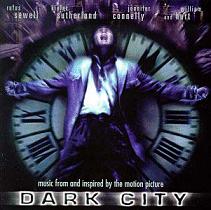 Another celebrated score was Dark City. Another celebrated score was Dark City.
TJ: I was asked to write a score for Dark City by director Alex Proyas in Sydney, Australia. Then I went to London to work on it and to record the music in Abbey Road studios. The fact is that Alex and I almost didnít talk at all about the music. I was totally free and was very inspired, so it all finished in only 3 weeks...
BS: It may be one of your most emotional works.
TJ: Really? It was a very photographic movie, and this helps us musicians to get a temperature of the film and use music accordingly, like when painters select the colors they want to mix for each part of the painting, in order to create a specific effect.
You need to be very involved in a film in order to develop a serious soundtrack. In Dark City I felt like entering a dark environment... I was out of this world. This kind of ecstasy is part of this job.
One of my sons was being involved at that time in the making of Harry Potter, and he was feeling like this as well.
BS: Is your son a musician?
TJ: No, he works in a camera team. We both know how these projects can keep us apart from everything else... Cinema is a family affair at home. Since my grand-father, down in South Africa, we have been always involved in movie industry.
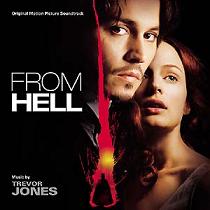 BS: When entering this present decade, you got involved in some important sci-fi tittles. Did you develop a sci-fi culture by reading comic books in your childhood and youth?
TJ: Not really. From Hell and the League of Extraordinary Gentlemen came to me without a previous knowledge of what was all about.
The makers just asked for powerful instrumentation. I didnít intend to clarify who was who in the film, I didnít think of specific themes for each hero, I just submerged into a Victorian era, filled it with intriguing atmospheres... Fancy movies, sci-fi, are very attractive in a sense that music emotions play a very relevant role in them.
BS: But in such movies it is usually essential to identify heroes with a thematic music... How did you manage?
 TJ: I focused on what was happening to each one of them, more than who they were. Iím proud of the music written in The League..., particularly for Mina and for the Invisible Man. TJ: I focused on what was happening to each one of them, more than who they were. Iím proud of the music written in The League..., particularly for Mina and for the Invisible Man.
BS: What happened to I, Robot? Was there a conflict with the crew?
TJ: Not at all. I know that sometimes filmmakers do not allow musicians to do their job in a proper way, and many composers share the same problem with time restrictions or instructions which are unacceptable. I had read the Asimovís story, so when Alex and I talked about scoring this film, I admit I was very enthusiastic about the project. The problem was that final orders came two months after my conversation with Alex and I was very busy scoring Around the World in 80 Days... I contacted the director and told him I hadnít the time needed to write a score for such a movie, the way that such an ambiguous film deserved...
BS: Marco Beltrami finally composed the score in two weeks... Did you have any specific idea in mind before the canceling of I, Robot?
TJ: I even wrote some sketches. I planned this to be a very futuristic score. I wish I had the chance to work on that project. Unfortunately I cannot choose how to do things, and I cannot do all Iím offered to do. I must respect a scheduled program and I need to concentrate fully on what I work. I know that some musicians can work in two projects at the same time... I just could not.
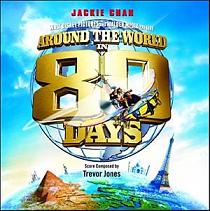 BS: So you kept on working for Around The World...
TJ: This was a difficult soundtrack. It included a wide range of sounds from diverse parts of the world. I didnít want to use ethnic clichťs... This wasnít a sort of documentary or serious film. It was a comedy, and comedies are very difficult to score. You cannot step on the jokes and you have to respect the work of authors and actors in dialogues and situations. Action continuously jumps from one situation to another, so you need to adjust music tempos to very different environments...
BS: Are you involved in any new project?
TJ: Iím writing music for an animation film based on a painting; a sort of musical poem which I consider very challenging. Iím also involved in academy work... I chair an academy about TV music, I teach to young composers and Iíve also been asked to visit South Africa in order to meet there with very young filmmakers... All this things also form part of my professional life.
Besides, Iím seriously considering your proposal to look back to my past compositions and study them more accurately. Maybe this will help me in my teaching lessons; maybe this will help me to know myself a little better... Sometimes Iím asked by any student about why did I write a specific piece for a theme, and I cannot find an answer.
I will also continue with my enthusiasm on writing new film music. I donít think I need to stop yet. Do I?
BS: Please, donít.
TJ: O.K. Then I won't.
Interview carried by Sergio BenŪtez. Transcription by Jordi Montaner
|





